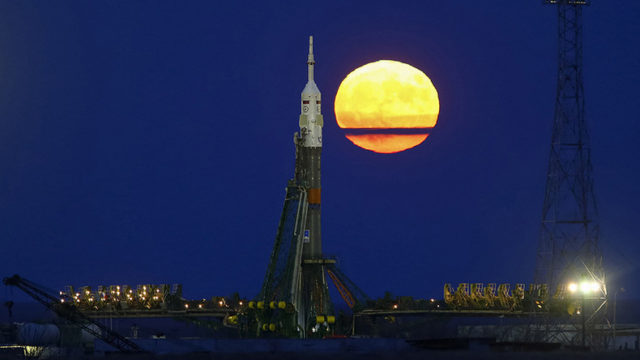
Defense Spending Keeps Russian Space Program on Life Support
Publication: Eurasia Daily Monitor Volume: 15 Issue: 16
By:

Roscosmos, the Russian government corporation responsible for Moscow’s space program, is consuming ever larger amounts of budgetary funds but is failing to provide anything in return. That situation has led to frequent predictions the Russian space program is on the brink of collapse. Some even add that if Roscosmos is ever cut off from selling rocket motors or launch services to foreign countries, it will not survive. Yet, the program remains focused on military needs rather than exploration: 80 of the 134 Russian satellites now in orbit are military rather than civilian. Moreover, Dmitry Rogozin, the Russian deputy prime minister in charge of space policy, remains an important player in Moscow politics. As a result, the Russian program is likely to continue to attract more money from the government even if it cannot deliver all that it promises—and could eventually become a choke point in Russian security planning (Obshchaya Gazeta, January 25, 29).
Last year was especially bad. Russia fell to third place, behind the United States and China, in the number of successful space launches. Worse, it suffered several high-profile disasters, including rocket explosions on the launch pad and the failure of satellites to operate even when successfully placed in orbit. But Moscow is especially angry, it appears, because Roscosmos failed to earn as much as planned by selling equipment and services to other countries. During 2017, in fact, it fell short of Moscow’s targets in this regard by 18.2 percent—more than any other government corporation—earning only 9.5 billion rubles ($150 million) instead of the 52 billion ($860 million) the Kremlin had been counting on (Obshchaya Gazeta, January 25, 29).
Moscow’s anger is reflected in the fact that it gave seven senior officials reprimands for Roscosmos’ failures (Obshchaya Gazeta, December 30, 2017). Even Rogozin, long the corporation’s chief defender, was compelled a month ago to write that the company had failed to live up to its responsibilities (Obshchaya Gazeta, December 29, 2017).
Russia’s space program suffers from two interrelated problems. On the one hand, it has always been focused on military needs, given that strategic weapons are the only sector in which Russia has sufficient strength to be counted as a major power. However, by their very nature, the direct products of strategic military programs are not things Moscow is ready or even able to sell abroad. Meanwhile, the Russian civilian space sector has always been a by-product of these military efforts, a step child that seldom receives the support from Moscow that it would need to be genuinely productive.
And on the other hand, Russia today does not have a clear ideological agenda, and nowhere is this more in evidence than in its space program. In Soviet times, Moscow viewed space exploration as a way of convincing the world of the superiority of Communism and thus was prepared to invest in a wide range of space projects to compete with the US and the West more generally. Now, lacking any such ideological vision, Moscow is far from one mind as to whether its space program should have any purpose besides a military one. Therefore, in many areas, including communications and research, Russia has no program at all and thus cannot compete with others or sell the products of its own operation.
That has led Roscosmos to come up with all kinds of money-generating ideas, some of them quite outlandish. For example, it has proposed turning the International Space Station into a hotel for wealthy earthlings looking for the ultimate travel experience. But most worrisome to Moscow: Roscosmos’ failures on the civilian side, which are only growing worse, are now being echoed on the military side as well. According to one Russian observer, “Our rockets continue to fall into the ocean without achieving orbit, and each such failure is the result of years of empty work and billions of rubles thrown to the wind, lowering the prestige of the country” (Obshchaya Gazeta, January 29).
That Russian expert continues: “One of the main [problems] is the general degradation of Russian science and high-technology production as a result of shortages of financing over the last quarter century. And it is obvious why, as a result, neither young specialists nor serious professionals are hurrying to join the space industry” or even to remain there for long if they do. Many blame Rogozin for the recent failures, and he certainly bears a fair share of responsibility; but the space sector itself and the lack of any decision by Moscow as to what it exists to do besides support the military are even more important factors.
The situation at Roscosmos is dire enough that Moscow may be forced to decide to focus only on military missions. But if it does that, scientists say, it will find itself falling ever further behind on military technology given that there is a symbiosis between pure science and military applications. Moreover, Moscow will discover that it is likely to be excluded from any breakthroughs—ideological, technical or even economic—that the pure science others are pursuing is giving them.
In the short term, Vladimir Putin may fire Rogozin—he has signaled his displeasure in a series of recent statements (Novaya Gazeta, January 24)—or throw more money at Roscosmos in the name of national security. But unless he and the Russian government are prepared to make some fundamental decisions, the domestic space sector will continue teetering on to the brink of disaster rather than being pulled back from it.



